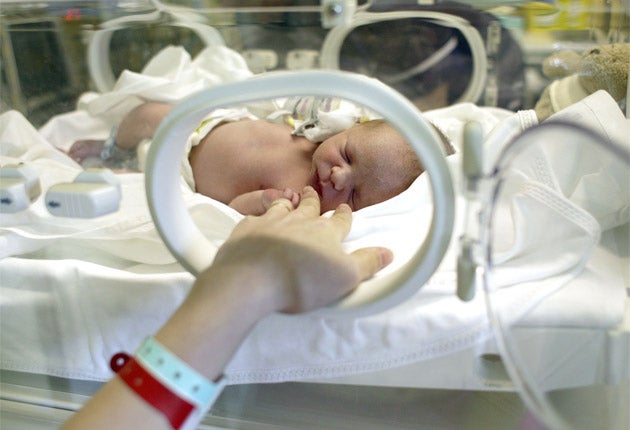Extra millions for baby units denied
Ministers reject task force's call to invest £89m a year in NHS neonatal units

Your support helps us to tell the story
From reproductive rights to climate change to Big Tech, The Independent is on the ground when the story is developing. Whether it's investigating the financials of Elon Musk's pro-Trump PAC or producing our latest documentary, 'The A Word', which shines a light on the American women fighting for reproductive rights, we know how important it is to parse out the facts from the messaging.
At such a critical moment in US history, we need reporters on the ground. Your donation allows us to keep sending journalists to speak to both sides of the story.
The Independent is trusted by Americans across the entire political spectrum. And unlike many other quality news outlets, we choose not to lock Americans out of our reporting and analysis with paywalls. We believe quality journalism should be available to everyone, paid for by those who can afford it.
Your support makes all the difference.Ministers last night pulled the plug on funding to bring the care of the sickest babies up to the standard for adults, in a sign of the impact of the credit crunch on the NHS.
Ministers had been expected to find the cash to back the recommendations of a task force on neonatal care. Its report, published today, identifies a shortfall of 2,700 nurses and 300 other staff, such as physiotherapists and dietitians, in England's 162 neonatal units. Neonatal care is that delivered to babies in the first 28 days of life.
The Neonatal Taskforce, appointed a year ago under the chairmanship of Sir Bruce Keogh, deputy chief medical officer, said sick babies should have one-to-one nursing in intensive care – the same standard already given to sick adults – in line with recommendations that have been made by professional medical organisations for the past 15 years. It recommended investment of £89m a year, with one-off costs of £102m, to bring care up to the necessary standard.
But ministers have refused to allocate the extra cash, which the taskforce says must instead be found from within local health budgets. The NHS is already facing demands to find £15bn-£20bn of savings by 2014, as a result of the credit crunch.
In 2007, 2,127 babies died in the first 28 days of life in England. Sixty per cent of all infant deaths occur in the neonatal period and evidence shows that one-to-one nursing reduces deaths and disability.
The Taskforce's recommendations had been widely anticipated and medical organisations said yesterday they had only been waiting to learn whether the Government would put its money where its mouth was. Almost one-third (30 per cent) of the 46 neonatal intensive care units in England have too few staff to deliver one-to-one care to the 19,500 babies they cared for in 2007.
Andy Cole, chief executive of Bliss, the premature baby charity, said it was a "huge missed opportunity". He added that the investment recommended by the taskforce to provide a "world class service" would cost less than £150 for every baby born. "That is the kind of insurance policy most parents would be prepared to take out to ensure their baby got the best standard of critical care, should they need it. We hope the NHS will find the money to deliver it," he said.
The Royal College of Nursing welcomed the report but criticised the lack of funding, and the Royal College of Paediatrics urged the Government to ensure the resources were made available.
Ann Keen, health minister, said: "Having a sick baby is very distressing for parents at what should be one of their happiest moments. That's why we're providing the NHS with practical guidance on how to make neonatal services even better and take a family-centred approach to care."
Join our commenting forum
Join thought-provoking conversations, follow other Independent readers and see their replies
Comments